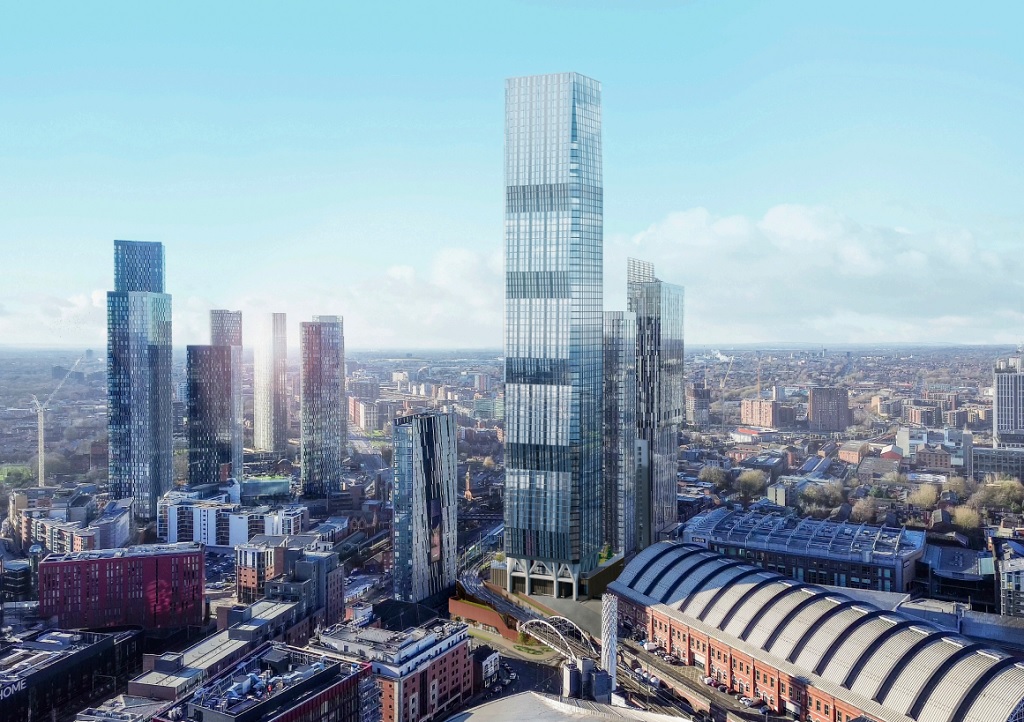‘Agent of change’ query sees towers return to Manchester agenda
After ‘minded to approve’ verdicts in April, planning committee members will again be asked to sign off residential projects by Salboy and Glenbrook following a representation from the Music Venue Trust.
Manchester City Council’s planning committee will meet on Thursday 29 May to look again at the proposals, along with granting a permanent permission for the Diecast venue at Store Street.
Phase two of Salboy’s Viadux scheme was approved in early April, including what will be Manchester’s tallest building at 76 storeys – a tower that will be operated under the high-end Nobu brand. There is also a 23-storey residential building, which will be fully affordable.
The ‘minded to approve’ verdict from 10 April was subject to three conditions, the first of which is the expiry of a consultation period relating to the updated highway chapter in the Environmental Statement, pursuant to Regulation 25 of the Town and Country Planning (Environmental Impact Assessment) (England and Wales) Regulations 2017.
With that period still live, an objection was received from the Music Venue Trust, presenting new information, on behalf of the Rebellion music venue at 2B Whitworth Street West.
Rebellion is described in the planning officers’ report as “a long-established Mancunian cultural space, being a home for live music since 2013 and hosting in excess of 220 events annually” that is an important hub of grassroots music and cultural activity in a city always keen to parade its creative and cultural credentials.
MVT said that Rebellion believes that the proposal presents an increased risk of noise complaints from incoming residents, thus placing the venue’s future under sustained risk of permanent closure, undermining the Agent of Change principle set out in national and local planning policy.
In summary, it said the scheme would “result in homes with unacceptable amenity and residential quality. The close proximity to the music venue is inappropriate for residential development based on the Agent of Change principle and that this accommodation would not result in a suitable living environment for future residents”.
MVT said that further acoustic testing should be undertaken, in active collaboration with the venue operator to ensure its robustness.
The trust, said officers, stress the importance of noise conditions to allow for reassessment and design of mitigation to ensure that the venue is not threatened by future noise complaints, and how critical it is to involve venue operators and MVT in such processes, saying no engagement had taken place so far in this matter.
The view of officers, however, is that the approval verdict is safe, pointing out that there are already numerous residential and commercial developments in a dense area of the city, along with trams and trains, and noise from Manchester Central events.
Furthermore, it is pointed out both that Viadux is given distance by being across the road, and that the homes in the main Viadux tower will be developed from floor 26 upwards, with a hotel on the lower floors. Suitable mechanical ventilation systems and noise mitigation measures have already been factored in, said officers, who concluded “it is not considered that any additional mitigation is required over and above that proposed and considered suitable by Environmental Health”.
Glenbrook is proposing 364 apartments in a 44-storey tower at 2-4 Whitworth Street West, next door to Rebellion – a representative of which addressed the April meeting when the application was considered.
MVT has weighed in, asking that if development is to go ahead, stringent conditions should be imposed. These include mandatory, legally binding notification to all prospective residents of the venue’s presence and its seven-day schedule of live music and nightlife; enhanced soundproofing standards for the new residential units to prevent future conflict; and a recognition in the planning process of the “agent of change” principle, whereby the burden of soundproofing and adaptation lies with the incoming development, not the pre-existing venue.
Again, the position of planning officers is that these issues have already been taken into account. As the report sets out: “The consideration of the proposal has recognised the ‘Agent of Change’ principle and the need to deal with the levels of noise emanating from the adjacent and nearby entertainment venues.
“The proposal includes a mechanical ventilation system and noise mitigation measures. Further mitigation measures are likely to be needed in relation to the levels of noise emanating from the Rebellion Nightclub during DJ sets and live performances throughout the week.
“It is anticipated that this would be achieved via either insulation in the façade build-up or attenuation measures at source within the nightclub, or a combination of both. This mitigation would be funded entirely as part of the development. A Grampian condition that prevents development from taking place until a noise mitigation strategy has been approved, is recommended. The noise mitigation measures would then be verified, to ensure compliance with the required noise limits, prior to occupation of the building.”




